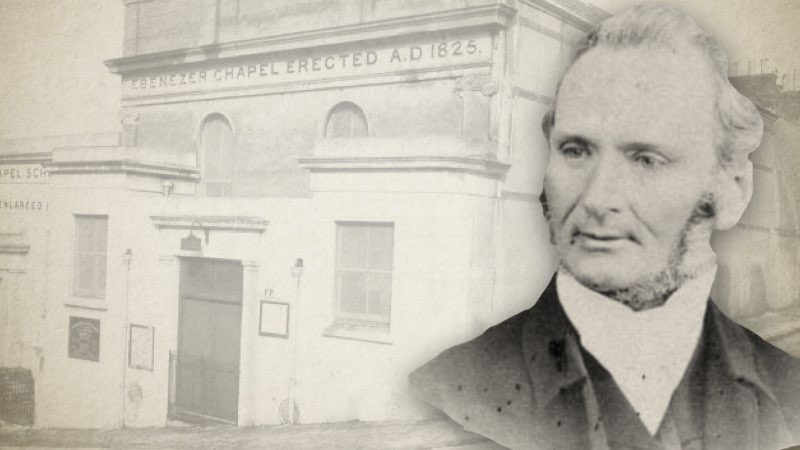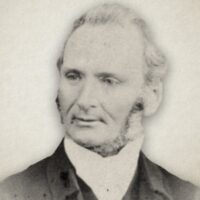
The Life And Ministry Of Israel Atkinson
Earthen Vessel 1854:
Ordination Of Mr. I. Atkinson
On Wednesday, April 17, 1854, Mr. Israel Atkinson was publicly ordained as pastor of the Baptist Church meeting at Ebenezer Chapel, Richmond-street, Brighton.
Morning Service.
Mr. Geo. Murrell, of St. Neot’s, gave out the 132d Psalm; after which, Mr. Field, of Greenwich, read part of Eph. 4. Mr. Murrell, of St. Neot’s, then gave out the second part of the 132d Psalm. Mr. Samuel Milner, of London, then stated the nature of a of a gospel church, basing his remarks on l Tim. 3:15, “The house of God, which is the church of the living God, the pillar and ground of the truth.” Mr. Milner first stated that the church was a company of faithful men and women, united together for gospel purposes, on gospel principles. He said it was common on these occasions to give our reasons for dissent; but we take higher ground. We conceive the New Testament to be the standard and test of the truth, and the church that comes nearest to the pattern of the primitive church to be the church of Christ; and all others to be dissenters. He then spoke of the church in general, the church militant and of a gospel church in a material form: its organization, its ordinances, and its discipline.
Mr. Milner then called upon one of the deacons to give some account of the leadings of Providence towards the church, and how they came to make choice of Mr. Atkinson as their pastor; when Mr. Gillman rose and made a statement, of which the following are the main features: Mr. Sedgwick was first sent by the great Head of the Church to preach the gospel in Brighton, in the year 1823, the Lord blessed his labours: and on the 21st of March 1824, a church was formed on gospel principles, composed of eleven persons. Their number continued to increase, and on the 2nd of July, in the same year, Mr. Sedgwick was ordained pastor. He preached to crowded congregations on week-evenings, in the Cavendish Street rooms, and on the Lord’s-day, in the large room at the Old Ship. The necessity of a more convenient place being felt, the erection of a chapel was determined on. The ground on which the present chapel stands, was purchased, and the building erected; and on April 13, 1825, was opened for divine worship, when Mr. John Stevens, Mr. Sedgwick, and Mr. Henry Heap preached. From this time to 1853, the Lord continued to bless the word spoken, and though the church had many difficulties, there was upon the whole great cause for thankfulness, that peace and prosperity prevailed. But it pleased the Lord in the past year to intimate to their late pastor, by a disease which terminated his mortal career, that his work was done. He was laid aside from his blessed employ, and wrote himself to a brother minister in London, requesting him to obtain Mr. Atkinson as a supply. Mr. A. complied, and his labours, together with the assistance of other ministering brethren, greatly relieved the mind of their late dear pastor; but his disease gradually progressed, and on the 26th of March, 1853, his spirit took its flight to the realms of bliss. After his interment, the pulpit was supplied by Mr. A. and various others, until at a church meeting held June 20th, 1853, it was agreed that Mr. Atkinson should be invited to supply for three months; at the end of that time, a special meeting was called, and a second invitation for three months. On the 9th of January, 1854, at a special church meeting, a third invitation for three months we agree upon, with a view to his becoming the pastor. His labours had been greatly blessed; many had felt the power of the word; and they had reason to hope that their past season of affliction would be succeeded by a time of joy, and gladness of heart; for they had perceived that the Lord was with them. Mr. Gillman appeared much affected in reading this statement, and many shed tears with him in remembrance of their late beloved pastor.
Mr. Milner then called upon those persons constituting the church to hold up their right hands in token of thrir choice of Mr. A. as their pastor. While the members stood with their hands uplifted, Mr. M. expressed in a solemn manner, his hope that they might never regret the step they had taken and that their hands might never be lifted up for the expulsion of him they had just chosen. He then called upon Mr. Atkinson to hold up his hand in token that he accepted the charge.
Mr. Atkinson then gave a deeply interesting account of his former days. He was born at Cambridge in 1817, and was arrested by the Almighty while on his knees by the side of his dying father. His uncle went to prayer, and while he was pouring out his soul to God, the Lord was pleased to effect the change. He was baptised by Mr. Foreman in 1837. After stating his views of truth, the way the Lord had led him into the ministry, how the Lord had opened doors for him to preach the Word, and the leadings of Divine Providence towards him up to the present time—which occupied nearly an hour, and which deeply interested the church and congregation. Mr. Milner asked the ministers present to give Mr. A. the right hand of fellowship, and likewise the church in the person or their deacon.
Mr. Foreman then affectionately addressed Mr. A. and Mr. Milner concluded by prayer.
Afternoon Service.
Mr. Milner gave out the 328th hymn—Rippon’s Selection. Mr. Murrell read part of Acts 20, and prayed for the future prosperity of the minister and the people. Mr. Milner then gave out the 410th hymn. Mr. John Foreman then delivered the charge from 2 Tim. 2:17, “Consider what I say; and the Lord give thee an understanding in all things.” Mr. F. spoke of the use of all means within the compass of revelation. Ministers were servants of the Most High, and Mr. A. had established his authority by the testimony he had given in the morning of his call to the ministry. He was a free gift to the people of God. The Lord was his Master, and He was a practical Master. Christ was his example in all patience, sympathy, and forbearance. The Lord finds the materials with which his servants are to work; they are not sent on the warfare at their own charges. After speaking of Mr. A., as a steward, sower, preacher, teacher, and shepherd, (all these characters, said Mr. F., were to be found in the Bible), he concluded his charge.
The first verse of the 415th hymn was then sung, and the afternoon service concluded by prayer. About 200 persons then sat down to tea in the school-room, and happiness seemed to prevail.
Evening Service.
Mr. Gillman gave out the 144th hymn, 2nd book—Watts. Mr. Foreman read Romans 12, part of Numbers 7, and Isaiah 42:12, and offered up prayer. Mr. Gillman then gave out the 403rd hymn—Rippon’s Selection; and Mr. Murrell preached to the church from Heb. 13:7, “Remember them which have the rule over you.” He exhorted the people to remember Mr. A., and to consider him as given in answer to their prayers; not to be idolized nor to be despised; to consider him as the man of their choice; to remember that his character was that of a ruler; to remember him, in his trials and temptations; to remember him by living in unity, by constant attendance, and by liberality. After a most impressive sermon, the 411th hymn was sung; and thus ended as solemn, yet delightful a service, as many present were ever privileged to attend.
J. Clark
Israel Atkinson (1817-1881) was a Strict and Particular Baptist preacher. In 1854, he was appointed pastor of Ebenezer Chapel, Richmond Street, Brighton, a position he held for Twenty-seven years.



